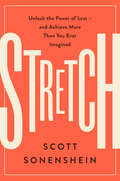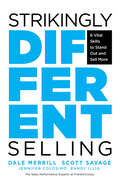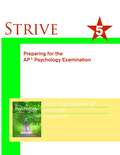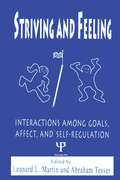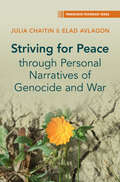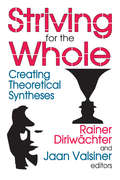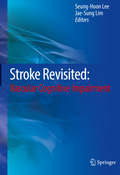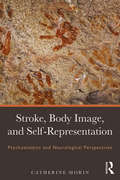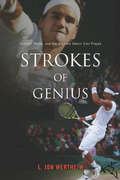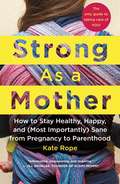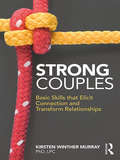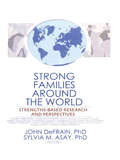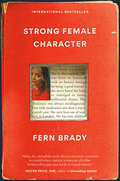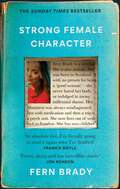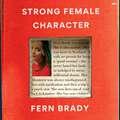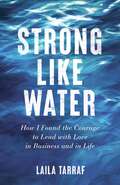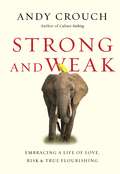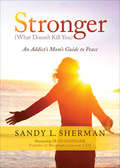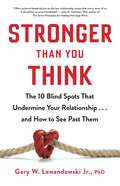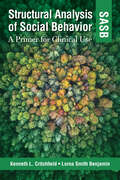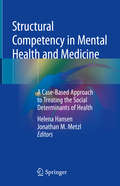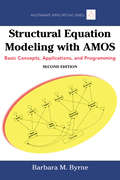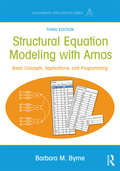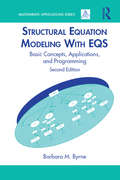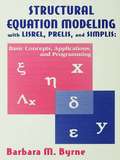- Table View
- List View
Stretch: Unlock the Power of Less -and Achieve More Than You Ever Imagined
by Scott SonensheinA groundbreaking approach to succeeding in business and life, using the science of resourcefulness.We often think the key to success and satisfaction is to get more: more money, time, and possessions; bigger budgets, job titles, and teams; and additional resources for our professional and personal goals. It turns out we’re wrong. Using captivating stories to illustrate research in psychology and management, Rice University professor Scott Sonenshein examines why some people and organizations succeed with so little, while others fail with so much.People and organizations approach resources in two different ways: “chasing” and “stretching.” When chasing, we exhaust ourselves in the pursuit of more. When stretching, we embrace the resources we already have. This frees us to find creative and productive ways to solve problems, innovate, and engage our work and lives more fully.Stretch shows why everyone—from executives to entrepreneurs, professionals to parents, athletes to artists—performs better with constraints; why seeking too many resources undermines our work and well-being; and why even those with a lot benefit from making the most out of a little.Drawing from examples in business, education, sports, medicine, and history, Scott Sonenshein advocates a powerful framework of resourcefulness that allows anybody to work and live better.
Strikingly Different Selling: 6 Vital Skills to Stand Out and Sell More
by Jennifer Colosimo Randy Illig Dale Merrill Scott SavageSuperior Sales Success#1 New Release in Global, Direct, and Industrial MarketingYou are competing with the top salespeople in your industry for the same customers. For each sales opportunity there is only one winner.What separates a “winner” from the rest of the very best and makes them “strikingly different”? Six years of focused research involving more than 2,800 sales professionals from 135 countries reveals the 6 vital skills that separate top sales performers from the herd. Learn what it takes to be that one winner!What really works to stand out and sell more? In their book Strikingly Different Selling, Dale Merrill, Scott Savage, Jennifer Colosimo, and Randy Illig (the sales performance experts at FranklinCovey) reveal the secrets to consistent, predictable sales success.The 6 Vital Skills. The author team found that most consultants and sales professionals believed they were doing a great job in their client interactions. Yet 70 percent of the time client executives felt their meetings with sales professionals were a waste of time. To the authors, this was a major surprise. But, for the “Strikingly Different” sales professionals, there were six things they did to consistently outperform their competitors and radically change their client interactions and results.Go from being just one of the sales crowd to the superior choice. Read Strikingly Different Selling: 6 Vital Skills to Stand Out and Sell More and learn the details behind the 6 skills.The 6 vital skills to stand out and sell more:Capture Attention with Verbal BillboardsCreate Excitement with Movie TrailersBuild Confidence with Flashbacks and FlashforwardsBecome Essential with “Why Us!” DifferentiatorsGet Curious and Find the GapsNavigate Traffic Lights and Close the GapsIf you have found books such as SPIN Selling, The Challenger Sale, To Sell is Human, The Secrets of Closing the Sale, or Start with Why to be useful; then your next read should be Strikingly Different Selling.
Strive for a 5: Preparing for the AP Psychology Examination
by David G. Myers Allison Herzig Nathaniel Naughton Laura BrandtThis book, Strive for a 5: Preparing for the AP® Psychology Examination, is designed for use with Myers' Psychology for AP®, Second Edition, by David G. Myers. It is intended to help you evaluate your understanding of the material covered in the textbook, reinforce the key concepts you need to learn, develop your conceptual understanding and communication skills, and prepare you for success on the AP® Psychology exam. This book is divided into two sections: a study guide section which will review each of the units in the textbook, and a test preparation section
Striving and Feeling: Interactions Among Goals, Affect, and Self-regulation
by Abraham Tesser Leonard L. MartinRecently, research on the ways in which goals, affect, and self-regulation influence one another has enjoyed an upsurge. New findings are being published and new theories are being developed to integrate these findings. This volume reports on the latest of this work, including a substantial amount of data and theory that has not yet been published. Emanating from a conference exploring affect as both a cause and effect in various social contexts, this book examines some of the complex and reciprocal relationships among goals, self structures, feelings, thoughts, and behavior. The chapters address: *the effects of intrinsic versus extrinsic goals; *the different effects of approach versus avoidance goals; *the role of awareness in goal pursuit and affective states; *the meaning of affective states in relation to goal attainment; *the impact of hedonistic concerns as motivational factors; *how people regulate their moods; and *the role of the self in affective experiences.
Striving for Peace through Personal Narratives of Genocide and War (Progressive Psychology)
by Julia Chaitin Elad AvlagonPersonal narratives of genocide and intractable war can provide valuable insights around notions of collective identity, perceptions of the 'enemy,' intergenerational coping with massive social trauma, and sustainable peace and reconciliation. Written in an accessible and narrative style, this book demonstrates how the sharing of and listening to personal experiences deepens understandings of the long-term psychosocial impacts of genocide and war on direct victims and their descendants in general, and of the Holocaust and the Jewish–Arab/Palestinian–Israeli context, in particular. It provides a new theoretical model concerning the relationship between different kinds of personal narratives of genocide and war and peacebuilding or peace obstruction. Through its presentation and analysis of personal narratives connected to the Holocaust and the Palestinian–Israeli conflict, it provides a deep exploration into how such narratives have the potential to promote peace and offers concrete ideas for further research of the topic and for peacebuilding on the ground.
Striving for the Whole: Creating Theoretical Syntheses
by Rainer Diriwächter and Jaan ValsinerThis unusual collection explores the development of ideas in psychology's past, and shapes them into a valuable resource for ideas in the discipline's future, with particular emphasis on holistic traditions in psychology. Diriwochter and Valsiner focus on developmental holistic psychology as advocated by the second school of Leipzig in Germany. Although largely neglected, this school of thought has provided some of the fundamental ideas necessary for a truly holistic approach in psychology. This volume includes Leibniz's dynamic holism and Ehrenfels' discussion about Gestalt qualities, which has generally been acknowledged as a major milestone in the formation of Gestalt psychology. Each chapter looks at the possible future of holistic psychology. Striving for the Whole contains several well-though out discussions on possible elaborations of holistic psychology by contrasting it with Ernst Boesch's cultural psychology, Pierre Janet's theory on emotions, and Jan Smuts holistic approach to personality theory. Discussions of holistic approaches in biology and evolutionary psychology, as well as a renewed look at Lloyd Morgan's comparative methodology, complete the volume. Striving for the Whole has been written by an international group of authors and will be of interest to students of the social sciences and intellectual history, and anyone who wants to dive deeper into holistic approaches that maintain their ties with empirical methodology. It is ideal for graduate and upper-level undergraduate courses in psychology.
Stroke Revisited: Vascular Cognitive Impairment (Stroke Revisited)
by Seung-Hoon Lee Jae-Sung LimThis book presents state of the art knowledge on vascular cognitive impairment (VCI). The focus is in particular on two major representative clinical syndromes of VCI: subcortical VCI and post-stroke cognitive impairment. Individual chapters address a wide range of topics and issues, providing up-to-date information on epidemiology, cognitive evaluation, pathophysiology, established and emerging neuroimaging biomarkers, amyloid imaging, serum and genetic biomarkers, prognosis, prevention, and treatment. The accompanying illustrations and photos enable the reader to achieve a ready understanding of the contents and to retrieve fundamental information quickly. The book will be an invaluable resource for stroke physicians, surgeons, and students wishing to learn more about the latest advances, from efforts to harmonize neuropsychological evaluation and improvements in diagnostic criteria through to the role of advanced neuroimaging techniques in deepening understanding of VCI and progress toward more targeted treatment.
Stroke, Body Image, and Self Representation: Psychoanalytic and Neurological Perspectives
by Catherine MorinStroke, Body Image, and Self Representation provides a psychoanalytic reading of the subjective difficulties encountered by patients who have suffered a stroke. The book is based on the words of stroke patients and on their self-portraits, which are then compared with the words and portraits of subjects devoid of brain lesions. Pathological and normal self-portraits illustrate in very concrete terms the libidinal investment of our body parts. The author's original data sheds an entirely new light on the subjective effects of a stroke. On the one hand, the permanent sequelae of a stroke can cause a narcissistic injury; on the other, a stroke may affect the brain circuitry involved in the patient's body image, undoing the normal narcissistic reactions. This may happen after right hemisphere lesions and cause spectacular symptoms, such as the personification of a paralyzed hand or the apparent ignorance of a severe paralysis. This double aspect of a stroke is no small problem for rehabilitation therapists, who must avoid two pitfalls: considering any issue as psychological in nature, as if the brain lesion could not produce any organic changes, or, on the contrary, attributing any behavioural problems to brain dysfunction, as if the patient was devoid of normal psychological reactions. One of the aims of this book is to help therapists gaining their bearings in this little-known field. In addition to this clinical interest, the author's psychoanalytic reading brings an original contribution to the physiopathology of cognition and self-representation. The data gathered by Catherine Morin show that self-representation cannot be considered only a cognitive operation. They also suggest that normal cognitive activity relies on both the stability of body image and the repression of the object. Stroke, Body Image, and Self Representation will appeal to psychoanalysts, psychologists, social workers, psychotherapists, psychiatrists, and rehabilitation therapists working with stroke survivors and patients with body image disorders.
Strokes of Genius: Federer, Nadal, and the Greatest Match Ever Played
by L. Jon WertheimThe executive editor of Sports Illustrated offers an in-depth analysis and behind-the-scenes look at the historic 2008 match between tennis titans. In the 2008 Wimbledon men&’s final, Centre Court was a stage set worthy of Shakespearean drama. Five-time champion Roger Federer was on track to take his rightful place as the most dominant player in the history of the game. He just needed to cling to his trajectory. So, in the last few moments of daylight, Centre Court witnessed a coronation. Only it wasn&’t a crowning for the Swiss heir apparent but for a swashbuckling Spaniard. Twenty-two-year-old Rafael Nadal prevailed, in five sets, in what was, according to the author, &“essentially a four-hour, forty-eight-minute infomercial for everything that is right about tennis—a festival of skill, accuracy, grace, strength, speed, endurance, determination, and sportsmanship.&” It was also the encapsulation of a fascinating rivalry, hard fought and of historic proportions. In the tradition of John McPhee&’s classic Levels of the Game, Strokes of Genius deconstructs this defining moment in sport, using that match as the backbone of a provocative, thoughtful, and entertaining look at the science, art, psychology, technology, strategy, and personality that go into a single tennis match. With vivid, intimate detail, Wertheim re-creates this epic battle in a book that is both a study of the mechanics and art of the game and the portrait of a rivalry as dramatic as that of Ali–Frazier, Palmer–Nicklaus, and McEnroe–Borg. &“Deftly touches on all the defining factors of contemporary tennis.&” —San Francisco Chronicle &“Illuminates a kingdom changing hands. An engrossing book.&” —Bud Collins
Strong As a Mother: How to Stay Healthy, Happy, and (Most Importantly) Sane from Pregnancy to Parenthood: The Only Guide to Taking Care of YOU!
by Kate RopeExpert, practical advice for complete mental and physical maternal healthKate Rope's Strong as a Mother is a practical and compassionate guide to preparing for a smooth start to motherhood. Everyone knows the secret to having “the Happiest Baby on the Block.” This is your guide to being the Sanest Mommy on the Block. It will prepare you with humor and grace for what lies ahead, give you the tools you need to take care of yourself, permission to struggle at times, and professional advice on how to move through it when you do. This book will become a dog-eared resource on your nightstand, offering you the same care and support that you are working so hard to provide to your child. It will help you prioritize your emotional health, set boundaries and ask for help, make choices about feeding and childcare that feel good to you, get good sleep, create a strong relationship with your partner, make self care an everyday priority, trust your instincts, and actually enjoy the hardest job you will ever love. This book is here to take care of you.
Strong Couples: Basic Skills that Elicit Connection and Transform Relationships
by Kirsten Winther MurrayStrong Couples: Basic Skills that Elicit Connection and Transform Relationships introduces an intelligent and flexible framework to guide sessions with couples. Informed by grounded theory research, this book provides a foundation for understanding couples’ needs and advancing sessions toward lasting and meaningful change. Drawing on illustrated case examples throughout, Murray demonstrates the value of couples counseling for all by providing an adaptive structure to be applied across diverse contexts and circumstances. With chapters focused on areas of self and relational awareness, genuine engagement, vulnerability and responsiveness, sharing responsibility, and valuing one another, this book will help counselors guide couple discoveries and new relationship experiences. Each chapter is fully integrated with therapeutic techniques to realize this process. Mobilizing the couple’s initiative to explore and develop their relationship, this book will aid counselors and marriage and family therapists alike to implement purposeful steps for helping couples change.
Strong Families Around the World: Strengths-Based Research and Perspectives
by Sylvia M. Asay John DeFrainThe strengths of families from culture to culture, when compared to each other, are remarkably similar and give us common ground around the world upon which to unite and develop mutual understanding. Strengths-Based Research and Perspectives: Strong Families Around the World, provides a conceptual framework for global family strengths, discussing the diverse strengths and challenges that families face regardless of location. This book presents 43 expert authors from 18 countries in all seven major areas in the world who explain what it means to be a family in the context of their country and the challenges their country faces in the world today. Focusing on the latest studies of similarities between strong families of different cultures, Strengths-Based Research and Perspectives: Strong Families Around the World presents a wide variety of disciplines, including family studies, family education, family therapy, modern languages, psychology, social work, sociology, cultural anthropology, and nursing. This insightful text centers on the Family Strengths Perspective, a paradigm that not only recognizes that there are problems in families today, but demonstrates clearly how these can be dealt with successfully. This valuable resource provides case study examples, quotations from literature and cultural mythology, tables, figures, and extensive references to give readers an in-depth understanding of the issues from strengths-based perspectives. Topics in Strengths-Based Research and Perspectives: Strong Families Around the World include: an introduction into the Family Strengths Perspective the International Family Strengths Model the propositions of the Family Strengths Perspective how the Family Strengths Perspective fits with other conceptual frameworks families from a global perspective a conceptual framework for understanding global family strengths and challenges Strengths-Based Research and Perspectives: Strong Families Around the World is useful as a text in marriage and family relationships classes, cross-cultural family patterns classes, strengths-based practitioner training classes, and family therapy and family educator training classes. This valuable resource will also be of great interest to family educators, family therapists, psychologists, social workers, nurses, and religious counselors.
Strong Female Character
by Fern BradyINTERNATIONAL BESTSELLER • &“Witty, dry, and gimlet-eyed, this is a necessary corrective in a world where Autistic women are all either written off as quiet and docile, or erased entirely.&” —Devon Price, Ph.D., author of Unmasking AutismScottish comedian Fern Brady was told she couldn't be autistic because she'd had loads of boyfriends and is good at eye contact. In this frank and surreal memoir, she delivers a sharp and often hilarious portrait of neurodivergence and living unmasked.After reading about autism in her teens, Fern Brady knew instinctively that she had it—autism explained her sensory issues, her meltdowns, her inability to pick up on social cues—and she told her doctor as much. But it took until she was thirty-four for her to get diagnosed.Strong Female Character is about the years in between, and the unique combination of sexism and ableism that so often prevents autistic women from getting diagnosed until adulthood. Coming from a working-class Scottish Catholic family, Fern wasn&’t exactly poised to receive an open-minded acceptance of her neurodivergence. With the piercing clarity and wit that has put her at the top of the British comedy scene, she now reflects on the ways her undiagnosed autism influenced her youth, from the tree that functioned as her childhood best friend to the psychiatric facility where she ended up when neither her parents nor school knew what to do with her.In a memoir as hilarious as it is heartbreaking, Fern leaves no stone unturned while detailing her futile attempts at employment, her increasingly destructive coping mechanisms, and the meltdowns that left her mind (and apartment) in ruins. Her chaotic, nonlinear journey—from stripping to getting arrested to finding a lifeline in comedy to her breakout appearance on the Taskmaster TV show as her full, unmasked self—is both a remarkable coming-of-age tale and a dark but poignant tribute to life at the intersection of womanhood and neurodiversity.Strong Female Character is a story of how being female can get in the way of being autistic and how being autistic gets in the way of being the 'right kind' of woman.
Strong Female Character: Nero Book Awards Winner
by Fern BradyBRITISH BOOK OF THE YEAR: AUDIOBOOK WINNER 2024NERO BOOK AWARDS WINNER 2023WINNER, NON FICTION BOOK 2023, BOOKS ARE MY BAG AWARDSSHORTLIST, BOOKSHOP.ORG INDIE CHAMPIONSSHORTLIST, AMAZON NON-FICTION BOOK OF THE YEARSHORTLIST, GOODREADS CHOICE BOOK OF THE YEARAudible Books of the Year 2023The Times Books of the Year 2023Apple Best Audiobooks of 2023BOOKSHOP.ORG Book of the Month January 2024THE SUNDAY TIMES BESTSELLER'I tore through this hilarious, smart, sad, revealing book' - Bob Odenkirk'Funny, sharp and has incredible clarity' - Jon Ronson'An absolute riot. I'm literally going to read it again once I've finished, and I'm a miserable bastard...it's a belter' - FRANKIE BOYLE'Strong Female Character is a testament to the importance of self-knowledge.' - Rachael Healy, The GuardianA summary of my book:1. I'm diagnosed with autism 20 years after telling a doctor I had it.2. My terrible Catholic childhood: I hate my parents etc.3. My friendship with an elderly man who runs the corner shop and is definitely not trying to groom me. I get groomed.4. Homelessness.5. Stripping.6. More stripping but with more nervous breakdowns.7. I hate everyone at uni and live with a psycho etc.8. REDACTED as too spicy.9. After everyone tells me I don't look autistic, I try to cure my autism and get addicted to Xanax.10. REDACTED as too embarrassing.'Fern's book, like everything she does, is awesome. Incredibly funny, and so unapologetically frank that I feel genuinely sorry for her lawyers.' - PHIL WANG'Of course it's funny - it's Fern Brady - but this book is also deeply moving and eye-opening'- ADAM KAY'It made me laugh out loud and broke my heart and made me weep...I hope absolutely everyone reads this, and it makes them kinder and more curious about the way we all live' - DAISY BUCHANAN'Glorious. Frank but nuanced, a memoir that doesn't sacrifice voice or self-awareness. And it has brilliant things to say about being autistic and being funny' - ELLE MCNICOLL'A set text for all of us in 2023' - DEBORAH FRANCES-WHITE'Fern is a brilliant, beautiful writer with a unique voice and even more unique story. Astute, honest and very, very funny.' - LOU SANDERS'So funny and brilliant' - HOLLY SMALE'Witty, dry, and gimlet-eyed, Strong Female Character is a necessary corrective. Brady offers a compelling, messy, highly resonant portrait of what masked Autism feels like.' - Devon Price, author of Unmasking Autism
Strong Female Character: The Sunday Times Bestseller
by Fern BradyFern Brady was told she couldn't be autistic because she's had loads of boyfriends and is good at eye contact. This is a story of how being female can get in the way of being autistic and how being autistic gets in the way of being the 'right kind' of woman.(p) 2023 Octopus Publishing Group
Strong Like Water: How I Found the Courage to Lead with Love in Business and in Life
by Laila TarrafLaila Tarraf was the Chief People Officer for Peet&’s Coffee and Tea, the iconic Berkeley coffee roaster that launched the craft coffee movement in America, but she had a secret: she was failing in the most important relationships in her life. Yes, she was a strong and effective business leader, the successful daughter of immigrants, and the mother of a toddler; but she was also disconnected from her own feelings and had little patience for the feelings of others. All that changed when life handed her a trifecta of losses: her husband died of an accidental drug overdose, and her parents' deaths followed in quick succession. Laila had spent her life leading from the head, convinced that any display of vulnerability would make her soft. What she didn&’t expect was that soft would turn out to be strong. As she reconnected to her heart, one painful step at a time, something remarkable happened: she became a better leader, a better mother, and a better person. Her heart turned out to be the true source of her power, at home and at work. This is a book about healing, about waking up, about learning who you are—who you really, truly are at the core—and reclaiming and embracing all the pieces of yourself you long ago abandoned in the name of survival. Women longing for balance will discover a path to infusing our leadership and relationships with love, compassion, and authenticity.
Strong and Weak: Embracing a Life of Love, Risk and True Flourishing
by Andy CrouchFlourishing people are strong and weak. Two common temptations lure us away from abundant living—withdrawing into safety or grasping for power. True flourishing, says Andy Crouch, travels down an unexpected path—being both strong and weak. We see this unlikely mixture in the best leaders—people who use their authority for the benefit of others, while also showing extraordinary willingness to face and embrace suffering. We see it in Jesus, who wielded tremendous power yet also exposed himself to hunger, ridicule, torture and death. Rather than being opposites, strength and weakness are actually meant to be combined in every human life and community. Only when they come together do we find the flourishing for which we were made. With the characteristic insight, memorable stories and hopeful realism he is known for, Andy Crouch shows us how to walk this path so that the image of God can shine through us. Not just for our own good, but for the sake of others. If you want to become the kind of person whose influence leads to healthy communities, someone with the strength to be compassionate and generous, this is the book for you. Regardless of your stage or role in life, whether or not you have a position of leadership, here is a way to love and risk so that we all, even the most vulnerable, can flourish.
Stronger (What Doesn't Kill You): An Addict's Mom's Guide to Peace
by Sandy L. ShermanFind The Love, Patience, and Insight to Take Your Life Back What does it look and feel like to be a Mother of an Addict? How does a Mother’s unconditional love help her child’s addiction? Sandy Sherman is a Mother of 2 addicts – a Daughter and a Son. For 5 years she felt her life was spiraling down into a pit of despair, fear, helplessness, grief that was consuming her life. She felt alone and humiliated and the dreams she had for her kids were all gone as she witnessed their addictions take over their bodies and souls. Sandy learned to live her life by deciding to take her life back. Through educating herself about the disease of addiction by reading, talking with other Mom’s, helping to counsel others and sharing her story, she has written Stronger in hopes of inspiring Mom’s to take action.
Stronger Than You Think: The 10 Blind Spots That Undermine Your Relationship...and How to See Past Them
by Gary W. Lewandowski Jr.Discover the ten myths sabotaging your love life, and the practical, science-backed tools you can use to reveal your relationship&’s hidden strengths and build a fulfilling, long-lasting bond.Dr. Gary W. Lewandowski Jr. is a nationally recognized expert on the psychology of relationships. In his first book, he blends hot-off-the-press science, engaging writing, impactful examples, and fascinating stories to present an impressive range of refreshing and eye-opening set of insights. For instance, did you know that . . . To forecast your relationship's future, you are the worst person to ask.Men are the real romantics in heterosexual relationships, not women.The amount of sex you should have to keep your relationship going strong is lower than you think.It's okay to be selfish. Putting me before you, can help both of you.When it comes to closeness, you can have too much of a good thing.Struggles actually strengthen your relationship.In terms of partner support, what you&’re not seeing is more important than what you notice.When your relationship doesn't help you become a better person, ending it does. A bold, fresh take on what it means to love and be loved, Stronger Than You Think will help you more confidently and accurately view yourself and your relationship—so that you can fully appreciate the love you have, or find the one you want and deserve.
Structural Analysis of Social Behavior (SASB): A Primer for Clinical Use
by Kenneth L. Critchfield PhD Dr. Lorna Smith Benjamin PhDStructural Analysis of Social Behavior (SASB) helps clinicians and researchers make objective assessments of relationship patterns, and enables clients to improve their social interactions. SASB can help identify connections between clients' current symptoms, and their current and historical relationship patterns. The SASB coding system serves as the basis for case formulation, which in turn informs the choice of interventions used in a variety of therapeutic approaches. SASB can also be used to evaluate the effectiveness of interventions, thus keeping therapy on track. This book summarizes over 50 years of research and clinical practice with SASB, and demonstrates how it can be used with any therapeutic approach. It has been traditionally used with patients who are comorbid, often rehospitalized, dysfunctional, and suicidal, although it can be used with any clinical population. SASB offers providers a therapy compass that helps clarify where the client is now, and pointing in the direction they need to go in order to reach their therapy goals.
Structural Competency in Mental Health and Medicine: A Case-Based Approach to Treating the Social Determinants of Health
by Jonathan M. Metzl Helena HansenThis book documents the ways that clinical practitioners and trainees have used the “structural competency” framework to reduce inequalities in health. The essays describe on-the-ground ways that clinicians, educators, and activists craft structural interventions to enhance health outcomes, student learning, and community organizing around issues of social justice in health and healthcare. Each chapter of the book begins with a case study that illuminates a competency in reorienting clinical and public health practice toward community, institutional and policy level intervention based on alliances with social agencies, community organizations and policy makers. Written by authors who are trained in both clinical and social sciences, the chapters cover pedagogy in classrooms and clinics, community collaboration, innovative health promotion approaches in non-health sectors and in public policies, offering a view of effective care as structural intervention and a road map toward its implementation. Structural Competency in Mental Health and Medicine is a cutting-edge resource for psychiatrists, primary care physicians, addiction medicine specialists, emergency medicine specialists, nurses, social workers, public health practitioners, and other clinicians working toward equality in health.
Structural Equation Modeling With AMOS: Basic Concepts, Applications, and Programming, Second Edition
by Barbara M. ByrneThis bestselling text provides a practical guide to the basic concepts of structural equation modeling (SEM) and the AMOS program (Versions 17 & 18). The author reviews SEM applications based on actual data taken from her research. Noted for its non-mathematical language, this book is written for the novice SEM user. With each chapter, the author "walks" the reader through all steps involved in testing the SEM model including: an explanation of the issues addressed an illustration of the hypothesized and posthoc models tested AMOS input and output with accompanying interpretation and explanation The function of the AMOS toolbar icons and their related pull-down menus The data and published reference upon which the model was based. With over 50% new material, highlights of the new edition include: All new screen shots featuring Version 17 of the AMOS program All data files now available at www.routledge.com/9780805863734 Application of a multitrait-mulitimethod model, latent growth curve model, and second-order model based on categorical data All applications based on the most commonly used graphical interface The automated multi-group approach to testing for equivalence The book opens with an introduction to the fundamental concepts of SEM and the basics of the AMOS program. The next 3 sections present applications that focus on single-group, multiple-group, and multitrait-mutimethod and latent growth curve models. The book concludes with a discussion about non-normal and missing (incomplete) data and two applications capable of addressing these issues. Intended for researchers, practitioners, and students who use SEM and AMOS in their work, this book is an ideal resource for graduate level courses on SEM taught in departments of psychology, education, business, and other social and health sciences and/or as a supplement in courses on applied statistics, multivariate statistics, statistics II, intermediate or advanced statistics, and/or research design. Appropriate for those with limited or no previous exposure to SEM, a prerequisite of basic statistics through regression analysis is recommended.
Structural Equation Modeling With AMOS: Basic Concepts, Applications, and Programming, Third Edition (Multivariate Applications Series)
by Barbara M. ByrneThis bestselling text provides a practical guide to structural equation modeling (SEM) using the Amos Graphical approach. Using clear, everyday language, the text is ideal for those with little to no exposure to either SEM or Amos. The author reviews SEM applications based on actual data taken from her own research. Each chapter "walks" readers through the steps involved (specification, estimation, evaluation, and post hoc modification) in testing a variety of SEM models. Accompanying each application is: an explanation of the issues addressed and a schematic presentation of hypothesized model structure; Amos? input and output with interpretations; use of the Amos toolbar icons and pull-down menus; and data upon which the model application was based, together with updated references pertinent to the SEM model? tested. Thoroughly updated throughout, the new edition features: All new screen shots featuring Amos Version 23.?? Descriptions and illustrations of Amos’ new Tables View format which enables the specification of a structural model in spreadsheet form.???? Key concepts and/or techniques that introduce each chapter. Alternative approaches to model analyses when enabled by Amos thereby allowing users to determine the method best suited to their data.? Provides analysis of the same model based on continuous and categorical data (Ch. 5) thereby enabling readers to observe two ways of specifying and testing the same model as well as compare results. All applications based on the Amos graphical mode interface accompanied by more "how to" coverage of graphical techniques unique to Amos. More explanation of key procedures and analyses that address questions posed by readers All application data files are available at www.routledge.com/9781138797031. The two introductory chapters in Section 1 review the fundamental concepts of SEM methodology and a general overview of the Amos program. Section 2 provides single-group analyses applications including two first-order confirmatory factor analytic (CFA) models, one second-order CFA model, and one full latent variable model. Section 3 presents multiple-group analyses applications with two rooted in the analysis of covariance structures and one in the analysis of mean and covariance structures. Two models that are increasingly popular with SEM practitioners, construct validity and testing change over time using the latent growth curve, are presented in Section 4. The book concludes with a review of the use of bootstrapping to address non-normal data and a review of missing (or incomplete) data in Section 5. An ideal supplement for graduate level courses in psychology, education, business, and social and health sciences that cover the fundamentals of SEM with a focus on Amos, this practical text continues to be a favorite of both researchers and practitioners. A prerequisite of basic statistics through regression analysis is recommended but no exposure to either SEM or Amos is required.
Structural Equation Modeling With EQS: Basic Concepts, Applications, and Programming, Second Edition (Multivariate Applications Series)
by Barbara M. ByrneReaders who want a less mathematical alternative to the EQS manual will find exactly what they're looking for in this practical text. Written specifically for those with little to no knowledge of structural equation modeling (SEM) or EQS, the author's goal is to provide a non-mathematical introduction to the basic concepts of SEM by applying these principles to EQS, Version 6.1. The book clearly demonstrates a wide variety of SEM/EQS applications that include confirmatory factor analytic and full latent variable models. Written in a "user-friendly" style, the author "walks" the reader through the varied steps involved in the process of testing SEM models: model specification and estimation, assessment of model fit, EQS output, and interpretation of findings. Each of the book's applications is accompanied by: a statement of the hypothesis being tested, a schematic representation of the model, explanations of the EQS input and output files, tips on how to use the pull-down menus, and the data file upon which the application is based. The book carefully works through applications starting with relatively simple single group analyses, through to more advanced applications, such as a multi-group, latent growth curve, and multilevel modeling. The new edition features: many new applications that include a latent growth curve model, a multilevel model, a second-order model based on categorical data, a missing data multigroup model based on the EM algorithm, and the testing for latent mean differences related to a higher-order model; a CD enclosed with the book that includes all application data; vignettes illustrating procedural and/or data management tasks; and description of how to build models both interactively using the BUILD-EQ interface and graphically using the EQS Diagrammer.
Structural Equation Modeling With Lisrel, Prelis, and Simplis: Basic Concepts, Applications, and Programming (Multivariate Applications Series)
by Barbara M. ByrneThis book illustrates the ease with which various features of LISREL 8 and PRELIS 2 can be implemented in addressing research questions that lend themselves to SEM. Its purpose is threefold: (a) to present a nonmathmatical introduction to basic concepts associated with SEM, (b) to demonstrate basic applications of SEM using both the DOS and Windows versions of LISREL 8, as well as both the LISREL and SIMPLIS lexicons, and (c) to highlight particular features of the LISREL 8 and PRELIS 2 progams that address important caveats related to SEM analyses. This book is intended neither as a text on the topic of SEM, nor as a comprehensive review of the many statistical funcitons available in the LISREL 8 and PRELIS 2 programs. Rather, the intent is to provide a practical guide to SEM using the LISREL approach. As such, the reader is "walked through" a diversity of SEM applications that include both factor analytic and full latent variable models, as well as a variety of data management procedures.
